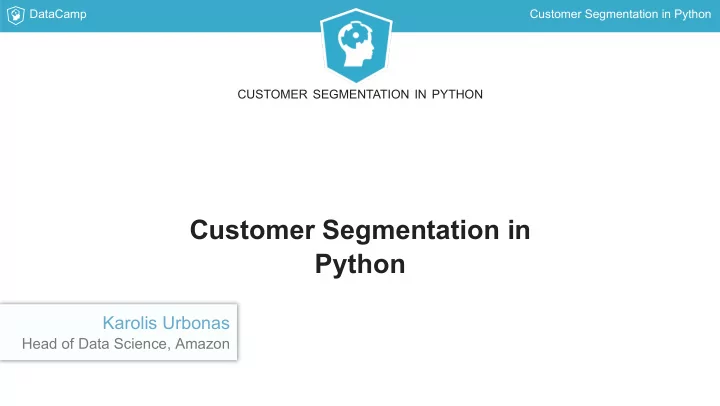

DataCamp Customer Segmentation in Python CUSTOMER SEGMENTATION IN PYTHON Customer Segmentation in Python Karolis Urbonas Head of Data Science, Amazon
DataCamp Customer Segmentation in Python About me Head of Data Science at Amazon 10+ years experience with analytics and ML Worked in eCommerce, banking, consulting, finance and other industries
DataCamp Customer Segmentation in Python Prerequisites pandas library datetime objects basic plotting with matplotlib or seaborn basic knowledge of k-means clustering
DataCamp Customer Segmentation in Python What is Cohort Analysis? Mutually exclusive segments - cohorts Compare metrics across product lifecycle Compare metrics across customer lifecycle
DataCamp Customer Segmentation in Python Types of cohorts Time cohorts Behavior cohorts Size cohorts
DataCamp Customer Segmentation in Python Elements of cohort analysis Pivot table
DataCamp Customer Segmentation in Python Elements of cohort analysis Pivot table Assigned cohort in rows
DataCamp Customer Segmentation in Python Elements of cohort analysis Pivot table Assigned cohort in rows Cohort Index in columns
DataCamp Customer Segmentation in Python Elements of cohort analysis Pivot table Assigned cohort in rows Cohort Index in columns Metrics in the table
DataCamp Customer Segmentation in Python Elements of cohort analysis First cohort was acquired in December 2010
DataCamp Customer Segmentation in Python Elements of cohort analysis First cohort was acquired in December 2010 Last cohort was acquired in December 2011
DataCamp Customer Segmentation in Python CUSTOMER SEGMENTATION IN PYTHON Explore the cohort table
DataCamp Customer Segmentation in Python CUSTOMER SEGMENTATION IN PYTHON Time cohorts Karolis Urbonas Head of Data Science, Amazon
DataCamp Customer Segmentation in Python Cohort analysis heatmap Rows: First activity Here - month of acquisition Columns: Time since first activity Here - months since acquisition
DataCamp Customer Segmentation in Python Cohort analysis heatmap Rows: First activity Here - month of acquisition Columns: Time since first activity Here - months since acquisition
DataCamp Customer Segmentation in Python Online Retail data Over 0.5 million transactions from a UK- based online retail store. We will use a randomly sampled 20% subset of this dataset throughout the course.
DataCamp Customer Segmentation in Python Top 5 rows of data online.head()
DataCamp Customer Segmentation in Python Assign acquisition month cohort def get_month(x): return dt.datetime(x.year, x.month, 1) online['InvoiceMonth'] = online['InvoiceDate'].apply(get_month) grouping = online.groupby('CustomerID')['InvoiceMonth'] online['CohortMonth'] = grouping.transform('min') online.head()
DataCamp Customer Segmentation in Python Extract integer values from data Define function to extract year , month and day integer values. We will use it throughout the course. def get_date_int(df, column): year = df[column].dt.year month = df[column].dt.month day = df[column].dt.day return year, month, day
DataCamp Customer Segmentation in Python Assign time offset value invoice_year, invoice_month, _ = get_date_int(online, 'InvoiceMonth') cohort_year, cohort_month, _ = get_date_int(online, 'CohortMonth') years_diff = invoice_year - cohort_year months_diff = invoice_month - cohort_month online['CohortIndex'] = years_diff * 12 + months_diff + 1 online.head()
DataCamp Customer Segmentation in Python Count monthly active customers from each cohort grouping = online.groupby(['CohortMonth', 'CohortIndex']) cohort_data = grouping['CustomerID'].apply(pd.Series.nunique) cohort_data = cohort_data.reset_index() cohort_counts = cohort_data.pivot(index='CohortMonth', columns='CohortIndex', values='CustomerID') print(cohort_counts)
DataCamp Customer Segmentation in Python
DataCamp Customer Segmentation in Python CUSTOMER SEGMENTATION IN PYTHON Your turn to build some cohorts!
DataCamp Customer Segmentation in Python CUSTOMER SEGMENTATION IN PYTHON Calculate cohort metrics Karolis Urbonas Head of Data Science, Amazon
DataCamp Customer Segmentation in Python Customer retention: cohort_counts table How many customers originally in each cohort in the cohort_counts table?
DataCamp Customer Segmentation in Python Customer retention: cohort_counts table How many customers originally in each cohort? How many of them were active in following months?
DataCamp Customer Segmentation in Python Calculate Retention rate 1. Store the first column as cohort_sizes cohort_sizes = cohort_counts.iloc[:,0] 2. Divide all values in the cohort_counts table by cohort_sizes retention = cohort_counts.divide(cohort_sizes, axis=0) 3. Review the retention table retention.round(3) * 100
DataCamp Customer Segmentation in Python Retention table
DataCamp Customer Segmentation in Python Other metrics grouping = online.groupby(['CohortMonth', 'CohortIndex']) cohort_data = grouping['Quantity'].mean() cohort_data = cohort_data.reset_index() average_quantity = cohort_data.pivot(index='CohortMonth', columns='CohortIndex', values='Quantity') average_quantity.round(1)
DataCamp Customer Segmentation in Python Average quantity for each cohort
DataCamp Customer Segmentation in Python CUSTOMER SEGMENTATION IN PYTHON Let's practice on other cohort metrics!
DataCamp Customer Segmentation in Python CUSTOMER SEGMENTATION IN PYTHON Cohort analysis visualization Karolis Urbonas Head of Data Science, Amazon
DataCamp Customer Segmentation in Python Heatmap Easiest way to visualize cohort analysis Includes both data and visuals Only few lines of code with seaborn
DataCamp Customer Segmentation in Python Load the retention table retention.round(3)*100
DataCamp Customer Segmentation in Python Build the heatmap import seaborn as sns import matplotlib.pyplot as plt plt.figure(figsize=(10, 8)) plt.title('Retention rates') sns.heatmap(data = retention, annot = True, fmt = '.0%', vmin = 0.0, vmax = 0.5, cmap = 'BuGn') plt.show()
DataCamp Customer Segmentation in Python Retention heatmap
DataCamp Customer Segmentation in Python CUSTOMER SEGMENTATION IN PYTHON Practice visualizing cohorts
Recommend
More recommend